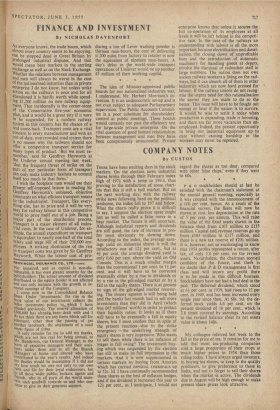FINANCE AND INVESTMENT
By NICHOLAS DAVENPORT
As everyone knowi, the trade boom, which almost every country seems to be enjoying, can be stopped dead in Great Britain by prolonged industrial disputes. And that Would mean bear markets in the sterling exchange as well as on the Stock Exchange. Whether the relations between management and men will always be worse in the case of the nationalised industries than in private enterprise I do not know, but unless strike action on the railways is once and for all abandoned it is hardly worth while spend- ing £1,200 million on new railway equip- ment. That incidentally is the corner-stone of the Conservative five-year economic Plan, and it would be a great pity if it were to be suspended, for a modern railway system in this country has the chance of a real come-back. Transport costs are a vital concern to every manufacturer and with an out-of-date, overcrowded road system there is no reason why the railways should not offer a competitive transport service for Many types of product. 'But we must re- member,' said Sir Geoffrey Heyworth at the Unilever annual meeting last week, that the frequent threat of strike on the Part of any particular form of transport can only make industry hesitate to commit itself too much to that form.'
I wish the footplate men would use their present self-imposed leisure in reading Sir Geoffrey Heyworth's unbiased, objective Comments on what efficient transport means to: the industrialist. Transport, like every- thing else, has its price and it will be very easy for railway labour in this competitive World to price itself out of a job. Being a Major part of the distribution process, transport is a major element of all indus- trial costs. In the case of Unilever, for ex- ample, the annual expenditure on transport IS equivalent to nearly one-half of the total salary and wage bill of their 250,000 em- Ployees. A striking illustration of the rise In transport costs was given by Sir Geoffrey
Heyworth. While the labour cost of pro- ,
ducing a ton of Lever washing powder is thirteen man-hours, the cost of delivering it 200 miles from factory to retailer is now the equivalent of nineteen man-hours. A day's delay in the world-wide transport operations of Unilever would tie up another £5 million of their working capital.
• *
The idea of Minister-appointed public boards for our nationalised industries was, I understand, Mr. Herbert Morrison's in- vention. It is an undemocratic set-up and is not even subject to adequate Parliamentary supervision. The Public Accounts Commit- tee is a poor substitute for shareholders' control at public meetings. These boards would certainly not pass the efficiency test for large-scale private enterprise. On the vital question of good human relationships between management and men they have been conspicuously unsuccessful. Private
enterprise knows that unless it secures the full co-operation of its employees at all levels it will be left behind in the competi- tive race. In the case of the railways an understanding with labour is all the more important because electrification and diesel- isation, the closing down of unprofitable lines and the introduction of automatic machinery for handling goods at depots, involve the dismissal of redundant staff in large numbers. The nation does not owe useless railway workers a living on the rail- ways, but it can absorb all of them in other industries which are now hard pressed for labour. If the railway unions do not recog- nise the urgent need for this rationalisation the sooner they are 'made to do so the better. This issue will have to be fought out sooner or later if the nation is to survive. It would, be wise to settle it today when production is expanding, trade is booming, and there are far more vacancies than un- employed. Indeed, the present opportunity to bring our industrial equipment up to date withouf causing hardship to the workers may never be repeated.


































 Previous page
Previous page